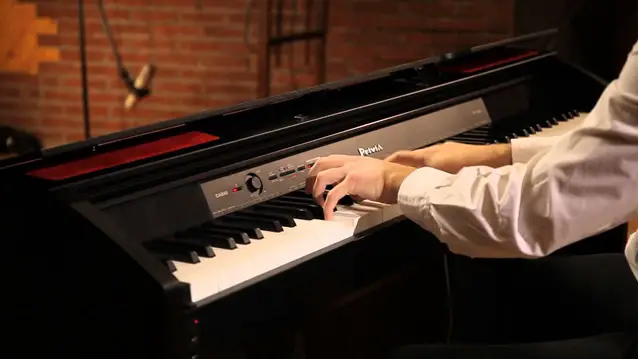
Here are useful tips for effective music practice to help you get the best out of your practice sessions; suitable for most musical instruments, including the piano.
For most music students and even the experienced musicians, usually its more about learning as much as you can in a fixed time, rather than devote more time, as most of us will always be pressed for time.
There is always a more intelligent way to learn and practice things. Though practicing regularly is important, there is only as much that you can do given the limited time that everybody has.
So how does one get the get the maximum out of their music practice sessions?
Learning’s from the Education Industry
Did you know that most research shows that studying for hours at one stretch can deplete chemicals in the brain that is required for learning?
And you thought you could just play for hours at one stretch and learn your favorite song?
Education Industry experts have identified that the mind’s capacity to learn and understand declines drastically after a prolonged session that requires intense concentration.
For that reason, it is advisable to take regular breaks (say a 5-minute break after around every thirty minutes or so) and not to practice more than four hours consecutively.
I would definitely like to know if any of you beginners have practiced continuously for four hours consecutively!
Top Tips for Effective Music Practice
Here are some useful tips (suitable for all musicians) that will help you maximize your practice time and get much better results for the time that you devote.
Here’s a summary of the things that you need to keep in mind, to make your music practice more effective.
Remember you can apply these to any musical instrument. So it doesn’t matter if you play the violin or the guitar of the flute, the concepts still applies.
- Practice everyday – I’m sure you have heard this from everybody and its really true. For best results, regular practice is the way to go, even if its for 15-20 minutes. Over a period of time, you will need to learn how to make the maximum use of this practice time. This means, you will need to get the more important things done in this time, and not necessarily do the things that you like (avoid playing only your favorite songs all the time, stop procrastinating and pick up that challenging piece, and so on). The below points will definitely help, but you also need to keep on thinking how to get the most important things done in your practice time.
- Make sure you’re comfortably seated, your posture is correct – this is where having useful music accessories is so important to structure your practice session (this one is for the more serious students)
- Make sure your practice area is comfortable, it should motivate you and there should be less of distraction. The better player you become, the more this space becomes important.
- Take care of your instrument – This ones important too. The better your instrument looks and sounds, the more you will be inspired to play. Besides, there will be lesser disruptions in your practice, the longer your instrument stays in shape.
- If you have a music teacher, make sure you discuss what are the more important things that you should focus on, so that you can at least cover those in your practice session, when you have limited time. That is why a music teacher is so important; without one, its difficult to know, and it can take years before you figure out how
- Rewards – Although this works for everybody, its more important in the case of the younger beginners. Good progress should be rewarded to keep the younger students motivated
- Break any new song into small sections and to practice those musical sections at a much slower tempo. Forget about the tempo that is mentioned in the sheet or the pace of the actual song! You can always speed up once you know the song. But to begin with break the song into small sections. Learn those individual sections at a much slower tempo, and then join them all together. This is the best way to learn any new song.
- Break your practice session in at least 3 parts – warm up, improve on existing knowledge, learn new things
- There are many who feel that every musician must do these things everyday – 1) Play scales, arpeggios, chords on the scale, in all possible positions. 2) Play etudes! 3) Transcribe great players. This is indeed true for the more serious students and pro musicians (feel free to tweak this to your liking). The fact is that these things will prepare you to tackle anything that is thrown at you, as a musician.
- Sooner or later, most intermediate and advanced music students / musicians will hit a plateau, where your progress doesn’t seem to match the amount of time you devote to your practice. Musicians who have spent years playing a music instrument will have experienced this. However, this is applicable to any learning process; this is the way learning happens in most of us. There’s a period where progress happens quite fast and then it remains stagnant for a long time (known as plateau on a learning curve), and then again you start seeing improvements. So you don’t have to get disheartened and give things up. Be focused and keep playing.
- If you had taken a long break from practicing (or playing), for whatever reason, you need to
start playing only for a few minutes initially. Play what you like – your favorite topics or songs and then gradually increase your practice time and start playing on a regular basis.
You can find more such tips in this post here on fundamentals of piano practice.
More Music Practice Tips
More Music Practice Books
Also Read: Here’s how to convert your spare room into a effective practice space.
Best Music Practice Apps
Music practice apps encourage you to play more frequently, helps you sharpen your skills, and also scrolls through sheet music by listening to what you’re playing (no need of a page turner).
Useful features of these apps include game-like rewards, interactive play-along scores, feedback to what/how you play. You can use these with most musical instruments – piano, violin, guitar and more.
While beginners have several options to learn to play their favorite musical instrument – methods books, software, DVDs, apps, lot of experienced musicians also use these apps. Couple of reasons for that are:
- Some of the classical pieces are too long to be played from memory. So they use an app to guide them through the notes.
- Some apps can hear you play, and turn the page on its own. So you don’t need someone nearby to turn the pages for you as you perform.
Music Apps by Tonara
Tonara is a music technology company (based in Israel), whose music apps are quite popular with professional musicians and teachers. Tonara’s iPad app, Wolfie for Piano comes with intelligent note/score tracking/page turning feature, besides many other features. It tracks your performance, records your wrong notes and gives you feedback; teachers can also use it to track students’ practice time and to grade their performance.
Grammy-winning pianist Emanuel Ax uses the app onstage and in practice sessions to read music without relying on a page-turner. The app can hear Ax and follow along, so it knows when to turn the page. “Until this year, I’d have to get someone to take a chair and turn pages for me. Even if you play the wrong notes, it seems to know where you are.”
Wolfie Piano App for iPad: Brief Intro
Teach, learn and play with Tonara >> Our latest update includes a statistics dashboard view for students to monitor their own practice progress, under the ‘Activity’ tab!
. . .#musicapp #musicteacher #musicstudent #musicpractice #musiceducation #musiced pic.twitter.com/gkksreeGSh— Tonara (@Tonara_Music) May 24, 2018
Study says practice alone may not make you perfect
10,000-hour theory debunked: Besides practice, genetic and environmental factors also influence what one accomplishes.
We all have grown up following the saying “practice makes perfect”. The adage was given a scientific backing when Malcolm Gladwell (journalist and author) wrote about the 10,000-hour rule in his 2008 bestseller, “Outliers”. Basicallym the rule says that if someone had to master something (like playing the violin), you need to put at least 10,000 hours of practice.
While we all know that the key to mastering a skill is practice, Gladwell said “ten thousand hours is the magic number of greatness” in his book, which chronicles how greats like Bill Gates and the Beatles toiled for thousands of hours before becoming experts in their fields.
The seed for the 10,000-hour rule was a 1993 study of violinists and pianists which found that musical prowess increased with accumulated practice time.
However, a new study published in ‘Royal Society Open Science’ that attempted to replicate the findings of the original belief, says that deliberate practice is not the only thing that you need to become an expert.
As per the study conducted, practice didn’t account for all the differences in performance, when they studied a group of violinists.
“A lot of people like the idea that with hard work and determination anyone can become an expert at anything. A lot more goes into mastering a skill than practice. Even the greatest in the world are not perfect, but to become great, a combination of genetic factors, environmental factors, and their interactions, also play a role,” says Macnamara, psychologist at Case Western Reserve University who was involved in the research.
However, despite the findings, I would say that practice should be a very important factor.
One of the original study’s coauthors, Ralf Krampe, a psychologist at the Catholic University of Leuven, also believes the same. He said the new findings about deliberate practice don’t disprove his own. The 1993 study he coauthored never concluded that the number of hours spent on a skill guarantees mastery. “But I still consider deliberate practice to be by far the most important factor.”
Closing Thoughts
Beginners want to learn to play their favorite music instrument quickly and are keen to play their favorite songs. But the fact is that you only have limited time to practice. By applying these techniques, you can dramatically improve the quality of your music practice sessions. You’ll be able to use your time more efficiently, increase the effectiveness and learn many more songs.
KeytarHQ editorial team includes musicians who write and review products for pianists, keyboardists, guitarists & other musicians. KeytarHQ is the best online resource for information on keyboards, pianos, synths, keytars, guitars and music gear for musicians of all abilities, ages and interests.



Leave a Reply